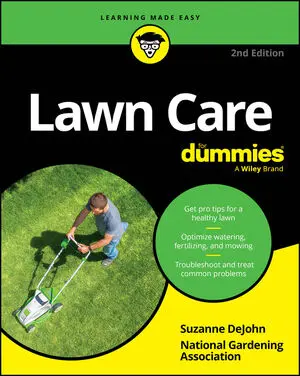This builtin is not currently supported: Animation
- Book & Article Categories

- Collections

- Custom Solutions
 Main Menu
Main MenuBook & Article Categories
 Main Menu
Main MenuBook & Article Categories
National Gardening Association
The National Gardening Association is the leading garden-based educational nonprofit organization in the United States, providing resources at garden.org and kidsgardening.org.
Articles & Books From National Gardening Association
The beginner-friendly guide to creating a lush and thriving lawn With Lawn Care For Dummies you get the know-how you need to grow a great lawn, improve an existing lawn, or keep your lawn healthy. You'll learn all about the different types of grasses, including where they grow best and what they need to thrive.
Cheat Sheet / Updated 01-27-2026
A lawn is so much more than just a patch of grass; it’s the soft spot in your yard where you play with your kids, entertain friends and family, spread out the picnic blanket, and settle in for an evening of stargazing. For many of us, a well-kept lawn is a thing of beauty, a bright and healthy expanse that creates a welcoming stage for our homes and gardens.
Article / Updated 08-03-2023
To get all the best flavor and highest nutritional value from your vegetables, you need to pick them at just the right time. Some vegetables taste terrible if you pick them too early; others are tough and stringy if you pick them too late. ©Jacob Lund / Adobe StockAnd after you pick your vegetables, what if you can’t eat them right away?
Article / Updated 08-03-2023
After you choose a good sunny spot for your vegetable garden and draw a plan on paper, you need to clean up the area so the soil will be easier to work. ©New Africa / Adobe StockYou can clear your garden area any time during the year, but the season before planting works best — clear in the fall for spring planting, or clear in the spring for summer or fall planting.
Article / Updated 04-24-2023
After clearing your garden area in preparation for planting, you need to take a close look at your soil — give it a good squeeze, have it tested, amend it, and then work it out to make sure it’s in shipshape.Good soil gives vegetable roots a balance of all the things they need: moisture, nutrients, and air. And knowing your soil type enables you to counteract problems that you may face when gardening on that piece of land.
Article / Updated 07-28-2022
Don't be afraid to repot your orchids while caring for them. Despite their reputation, orchids are tough, and repotting helps them thrive. You'll know it time to repot orchids when
Orchid roots are overflowing the pot
The plant itself is going over the edge of the pot
Potting material is getting soggy and drains poorly
The ideal time to repot most orchids is when the plant starts new growth — usually right after it finishes flowering.
Become a plant parent to some of the most stunning flowering plants you’ve ever seen Orchids display more beautiful and exotic flowers than you’ll find on other flowering plants, but they do require some love and care to grow well. With help from Orchids For Dummies, anyone can be successful in growing and flowering these gorgeous and fragrant plants in their garden or home!
Cheat Sheet / Updated 03-15-2022
Growing orchids at home isn’t as difficult as you might think. This handy Cheat Sheet will help you get started. Take a look at the list of fragrant orchids to decide which sweet scents you want around your house. You'll also find some helpful tips about knowing when and how to fertilize and water your orchids.
Create an eye-catching outdoor oasis with this no-nonsense guide to landscaping As families spend more time at home, they're expanding their living space to their yards, decks, and patios. When you're ready to upgrade the look of your landscape, Landscaping For Dummies offers advice on installing fences and walkways, choosing hardy plants and trees, and enhancing natural habitats for the critters and creatures lurking in your neighborhood.
Article / Updated 06-28-2021
You have only two choices when you harvest crops from your vegetable garden: Eat the veggies right away, or store them to use later. Specific vegetables need different storage conditions to maintain their freshness, such as:
Cool and dry: Ideally, temperatures should be between 50 and 60 degrees Fahrenheit (10 to 15.






